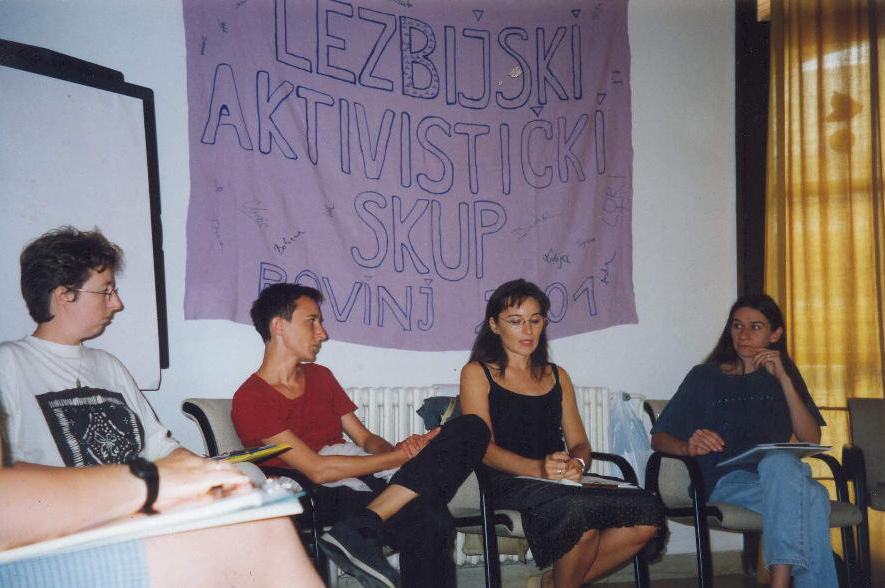
From the 3rd to 9th of September 2001, an Activist gathering of lesbians from the ex-Yugoslavia region under the title Equal citizenship, was organized in Rovinj, Croatia, by the lesbian group Kontra. The meeting brought together 35 activists from Croatia, Slovenia, Serbia and Kosovo, where there was a work meeting to create a common platform for the introduction of anti-discrimination measures in the legal system.
The participants adopted the documents Equal Citizenship and the Networking platform, which defines mutual cooperation, exchange of information, support and networking between lesbians from all countries and regions from the territory of the former state of Yugoslavia. The meeting was attended by representatives from groups Deve and Labris from Serbia, Kontra and LORI from Croatia, informal group LP, Kosovo, Škuc - LL, Slovenia, as well as individual activists.
Final document of the
LESBIAN ACTIVIST GATHERING
In Rovinj from the 3rd to the 9th of September 2001
Lesbian activist meeting brought together 35 lesbians from Croatia, Kosovo, Macedonia, Slovenia and Serbia, at a working meeting in order to create a mutual platform for the introduction of anti-discriminatory measures to the legal system.
During the six days of work and exchange of experiences between longtime activists for lesbian human rights, it was found that the position of lesbians in all states in the region of former Yugoslavia is discriminatory and inappropriate in the context of standards of an open, democratic society.
In post-conflict and transitional societies there is a noticeable shift in respecting human rights in general, although during the meeting it was concluded that the human rights of lesbians and gay men in particular are neglected and in some regions and countries are totally negated and ignored.
During the discussions, the problem of the position of lesbians in the society, in the state system, in the family, in political institutions, in education, in the environment of their workplace was talked about. In particular, they discussed how the ten-year war in the region intensified patriarchal nationalist clerical values and repressed possibilities for lesbian visibility and narrowed down the social space for lesbian rights.
The status of lesbian and gay rights is utterly inappropriate in all these countries except for a slightly more favorable situation in Slovenia. For example, no state in its constitution has anti-discriminatory articles which mention sexual orientation as a ground for discrimination. Secondly, no country allows the possibility of legal regulation of same-sex partnerships. These facts have for its consequence a greater social vulnerability of the lesbian and gay population, and greater exposure to the phenomena of violence, stigmatization, discrimination and social isolation.
The gathering criticized the unresponsive state instruments, particularly the police, in Serbia, which is in Belgrade on June 30th of 2001 tolerated cruel violence against lesbians, gay men and other citizens who took part in a peaceful celebration of the International Day of Pride of gays and lesbians. Participants adopted the PLATFORM FOR THE ORGANISATION OF STREET DEMONSTRATIONS in order to take advantage of previous experiences in Belgrade and Ljubljana for a more efficient organization of future public events.
With the document EQUAL CITIZENSHIP, we seek a policy of equal opportunities and equal citizenship regardless of sexual orientation.
We are looking for change in:
- Constitution, to include anti-discrimination articles. The harmonization of all laws and regulations in order to be in line of this new anti-discrimination article of the constitution;
- Criminal Code which would sanction discrimination and human rights violations based on sexual orientation;
- Law on Labor which would include non-discrimination on grounds of sexual orientation in employment, and improving in the workplace. In addition, we are demanding sanctioning of sexual and homophobic harassment in the workplace;
- Law on family relations so that there is a possibility of legalization of same-sex relationships, and enjoyment of the same rights and opportunities as heterosexual partners - marriage or extra marital unions;
- Law on reproductive rights, to allow artificial insemination for all women regardless of marital status or sexual orientation;
- Law on education in order to insert in the educational system the existence of lesbian and gay existence and their human rights;
- Law on the media/ Law on public information in order to exclude all forms of discrimination and promote non-homophobic media language;
- Law of health to introduce a non-discriminatory treatment of lesbians in health institutions.
Every country should establish specific mechanisms for the implementation of equality of all citizens and monitor the implementation of anti-discriminatory laws. In addition, we appeal to the non-governmental human rights organizations and women's human rights organizations to promote the human rights of lesbians and gay men.
In Rovinj, 9th of September 2001
Participants:
Deve, Belgrade
Kontra, Zagreb
Labris, Belgrade
LORI, Rijeka
LP, Priština
ŠKUC – LL, Ljubljana
and individual activists
*One of the most important results of this meeting is a mailing list “Rovinj activists” which is functioning to this day!
foto: Regional lesbian gathering in Rovinj, September 2001; Rachel Wareham, activist from LP Priština, Ljiljana Živković activist from Labris, Tatjana Greif, activist from Škuc LL. Labris archive

